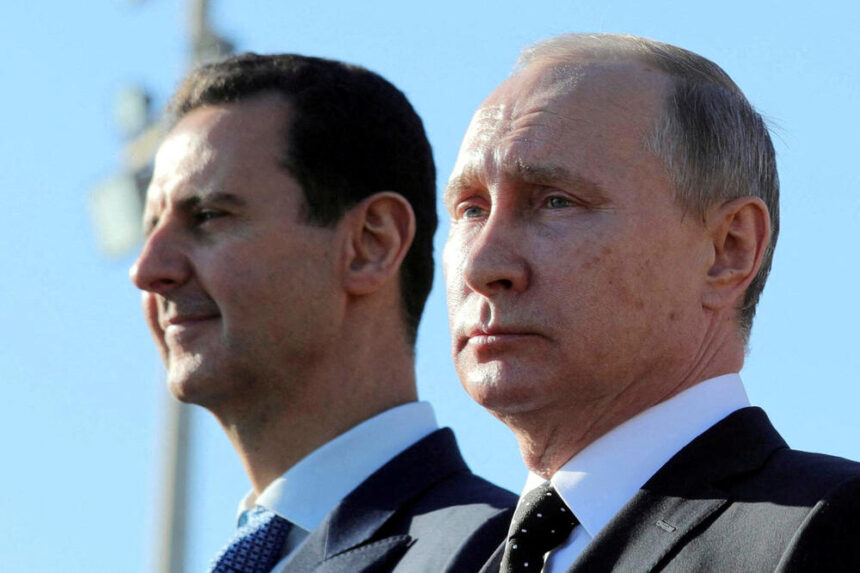The potential fall of Syrian President Bashar al-Assad’s regime has dealt a severe blow to Russian ambitions in the Middle East, raising concerns about Russia’s military presence in Syria and its influence on the global stage.
When Vladimir Putin took power in post-Soviet Russia a quarter of a century ago, he quickly set to work restoring Moscow’s status as a global power. It took 15 years, but Russia’s military intervention in Syria was touted as a declaration of its return as a major international player.
The intervention in Syria not only helped expand Russia’s influence across the Middle East but also served as a counterbalance to the West. However, the potential collapse of the Assad regime, a key Russian ally, has posed a serious challenge to Russia’s ambitions in the region.
Russia’s Military Footprint in Syria
“Putin’s military adventure in Syria was designed to showcase Russia’s power and its ability to project influence abroad,” said Middle East expert Filip Smith. The loss of Syria would be a significant “slap” to Putin, damaging Russia’s reputation and strategic position in the region.
Syria hosts two critical Russian military facilities: the airbase in Hmeimim and the naval base in Tartus. The latter is Russia’s only naval facility on warm seas, granting Moscow access to the Mediterranean. “Russia has used its bases in Syria to project its power both in the Eastern Mediterranean and across the broader Middle East,” added Smith.
Russia’s intervention in Syria in 2015 significantly altered the course of the Syrian civil war, with airstrikes on rebel positions helping the Syrian military reclaim territory and keep Assad in power. The intervention came a year after Russia’s annexation of Crimea and its support for separatists in Eastern Ukraine, signaling Moscow’s ambition to challenge the West globally.
Challenges in Maintaining Military Campaigns
Following Russia’s full-scale invasion of Ukraine in February 2022, Syria became an increasingly important theater for Moscow, although it also presented the challenge of managing military campaigns on two fronts. Now, the potential fall of Assad has made this task even more daunting.
As Russia invests heavily in a counteroffensive to reclaim territory lost in the Kursk region of Ukraine, it faces increasing difficulties, including relying on support from North Korean forces. Moscow also seeks to secure as much territory in eastern Ukraine as possible before potential peace talks.
Russian Bases at Risk
Experts warn that Russia’s military facilities along Syria’s Mediterranean coast could be vulnerable to militants led by Hayat Tahrir al-Sham (HTS), a U.S.-designated terrorist group. These groups, along with their allies, may soon threaten Russia’s strategic foothold in Syria.
Aron Zelin, a senior fellow at the Washington Institute, emphasized that Russia no longer has the firepower to protect its assets in Syria. “It’s important to remember that Russia is now dealing with a much larger war in Ukraine compared to when they first entered Syria in 2015,” Zelin said. “Russia also has forces fighting in sub-Saharan Africa, and unlike ten years ago when Russia had the Wagner Group led by the late Yevgeny Prigozhin, Russia doesn’t have the same capabilities or resources to handle the situation.”
The Loss of Tartus: A Strategic Setback
Zelin further stated that losing the naval base in Tartus would be “an extremely significant loss for Russia,” as it is the only Russian port on warm seas, crucial for Russia’s naval activities and power projection. “Losing it would essentially push Russia out of the heart of the Middle East,” he added.
Limited Russian Intervention
Despite launching dozens of airstrikes since the HTS-led militants began their offensive against Assad’s forces in late November, Russia has failed to halt the rebel advance. The situation in Syria now appears increasingly untenable for Moscow, especially with the rise of opposition forces.
A Heavy Price for Failure
Experts predict that Russia will face serious consequences for its failure in Syria. “The fall of Assad is a major blow to Russia’s claims of being a global power in terms of maintaining military and political influence abroad,” said Hamidreza Azizi, a fellow at the German Institute for International and Security Affairs.
This loss could have wider implications for Russia’s global influence, as countries in regions like Latin America and Africa may begin to reassess their reliance on Russia, Azizi concluded.







